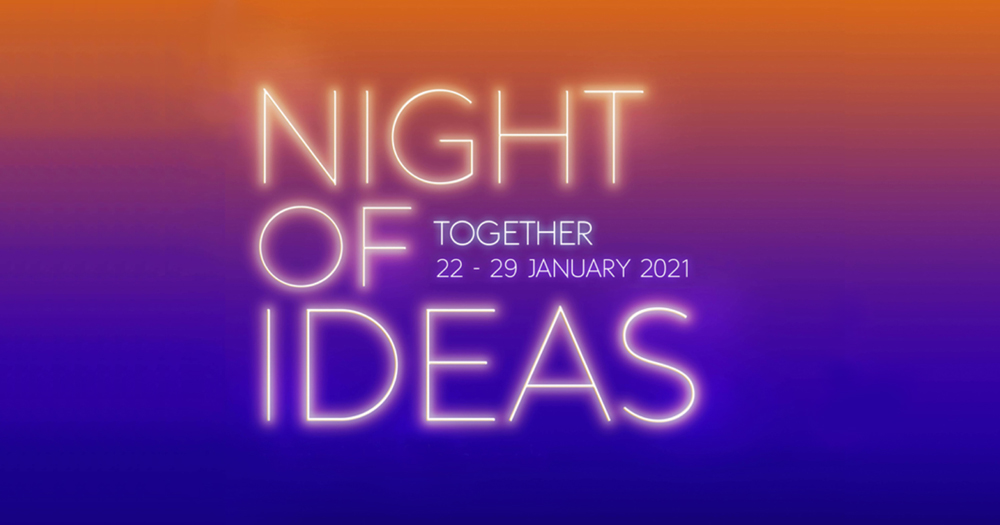«Spanish is such a useful language in today’s world»

We interview Elijah Berry, a 21-year-old student of Spanish and German at the University of Bristol. He recently completed his compulsory year abroad in Argentina and he is now studying his final year to graduate in 2021.
Berry recently won the Warwick Prize in Undergraduate Translation, with the translation of three texts from Spanish into English.
Why do you study Spanish?
I’ve studied Spanish since year 10 in secondary and I really enjoyed it all through GCSE and Alevel (it was one of my favourite subjects, I had a really good teacher and a lovely group of people in my class). I really believe that you should do something that you enjoy and so that is what I did. Spanish is also such a useful language in today’s world with so many speakers and learners.

What do I like most about it? What are biggest challenges?
I love that I can talk to people in their own language, rather than others always having to use English, I think it’s the best way to be able to understand other cultures and identities. Also being able to read Spanish language books, watch Spanish language movies and TV shows (there are some great ones out there) in their original language is very satisfying and I really get a lot out of it. Getting to learn about history, culture but also linguistics which I find really interesting and have only discovered during my time at university – but I love it! Translating is also a fun and unique aspect of language learning which I really like doing as well.
I think for me the biggest challenge is reaching and maintaining fluency – I’m still working my way there – but hopefully after some more time living in Spanish speaking countries, I will reach my goal.
What are my future plans in relation to Spanish?
Next year after graduation I am planning on doing a British Council Teaching Assistantship in either Ecuador or Spain. I am also interested in getting into the world of professional translation in the future. I definitely don’t want to lose my Spanish and I want to keep it up always! Spanish will always be important to me.

In the mood for reading? Don’t miss our e-book platform!
Our library is here to support you during these difficult times. Discover our e-book platform: e-books, audiobooks and videos. Search, find, download or stream the latest novels from the most important Spanish and Latin American authors, our easy readers, grammar books, children books, audiobooks and videos.
How?
1.- Access to the Platform (via Web or App).
2.- Sign in with your library card number and password. If you don’t have a valid library card, please, contact us: biblon@cervantes.es
3.- If you want to use a PC (Windows or Mac) you will need to install Adobe Digital Editions to download the books
4.- If you want to use our e-library from your mobile or tablet, please download our app ‘ Libros-e Instituto Cervantes’ and access your Library account.
The app is available in AppStore from iOS, Google Play from Android and in Windows Phone from Microsoft.
You can use our e-library 24/7 whenever you want wherever you are if you have Internet connection
If you need further assistance, we are here to help. You can contact us: biblon@cervantes.es
And… don’t forget… You can also join our Book Club and our Conversation Club every month
Learn to connect, connect to learn.
Learning a new language expands your world.
connects you with more people, more opportunities
and opens up new doors, pathways and challenges
Because learning a language is more than just earning a certificate:
It is discovering how being understood makes you a part of things;
It is understanding how to reach the hearts of others.
Instituto Cervantes, 30 years dedicated to making Spanish
a greater, more universal language
connecting more and more people.
Now, all our experience, and our highly qualified teachers,
are available in our on-line courses.
Taking Spanish to every corner of the world
and your heart to wherever it desires.
Instituto Cervantes.
Learn to connect,
connect to learn.
#InstitutoCervantesenlínea
«The corona pandemic has isolated most individuals in their private realm»

Manuel Arias Maldonado is Associate Professor in Political Science at the University of Malaga (Spain). Maldonado has been a Fulbright scholar at the University of Berkeley and a visiting researcher in Munich and New York.
Maldonado has published a book in Spain about the sentimentalisation of politics and a number of papers on the digitisation of social life. His latest books deal with the Anthropocene and the Covid-19 pandemic.
Maldonado takes part in this year’s edition of Night of Ideas, at the debate Lonely Together with Fay Bound Alberti, author of A Biography of Loneliness & Cultural Historian, from the University of York, and Clémentine Lalande, CEO of Once online dating app.
This year you take part in the In the Night of Ideas, what does it represent to you?
It is an exciting opportunity to share my thoughs on the topic with the rest of the participants and the public. Tellingly, we will do it thanks to the same technology that will be subject to discussion. On the other hand, the very existence of a Night of Ideas is a tribute to the key role that ideas play in the human experience -as something that invites us to see the world in particular ways and incites us to change it.
The topic of your debate is Lonely Together. What are your thoughts on it?
Human beings have been «lonely together» for centuries. Even before the invention of the print, some cultuvated people wrote to each others letters that crossed continents, thus helping them to alleviate their loneliness or isolation. As new communication technologies emerged, from the telephone to the radio, togetherness could comprise a greater number of people. Yet mass communication did not allow individuals to answer back – we just passively received messages from the few who produced them. Digital technologies are different: individual people can now connect to each other on a regular basis in different ways, ranging from chats to video apps. Thus we can now create our own networks. The public space is thus fragmented, while our private lives acquire a multi-faceted quality. Does this increase loneliness? I am not sure. People still need the direct contact of others and it seems to me that digital technologies just add a new layer of sociality to our everyday lives. For instance, we can be in touch more easily with those who live far from us — be them family or friends. And for those who are shy, writing can be easier than an in-person encounter. Social networks have problems of their own and they must be discussed, but I would argue against the idea that greater connectivity is a bad thing for the individual. Loneliness and togetherness stand in a difficult relation and this relates in turn to the tension between individuality and sociality in human beings. Digital technologies can disrupt such relation, but they cannot put an end to that tension.
How do you feel about the use of digital networks during the current lockdown in the UK and other parts of the world?
The corona pandemic has isolated most individuals in their private realm and this in turn has shown the communicative potential of digital technologies. It may be argued that governments might have never been able to impose such strict lockdowns across the world without the existence of digital networks, which have been very beneficial – they have alleviated loneliness, facilitated the exchange of information, and provided entertainment. In sum, they have been a substitute for ordinary life. Naturally, they have also allowed the continuation of economic activity in many sectors, thus preventing a greater damage to virus-battered societies.
Can we be emotionally connected in the digital world?
Indeed. Emotional connection does not require in-person communication, as the entire history of the novel – not to mention the radio or television – comes to show. There are all kind of experiences in the digital world: some are personally affecting, some are not. On the other hand, it would be necessary to define what do we mean by «emotional connection». To which emotions are we refering to? Social networks can often elicit resentment, animosity or envy (let us think of the effect that the glittering images of the life of others as staged in Instagram usually has on the observers). I am afraid that this should also count as a kind of emotional connection. Yet if we reserve the term for a positive connection, associated to solidarity or love, well, we can feel that connection as well. Needless to say, we may feel that something is missing – that the presence of others provide something to communication that is unique and valuable. But this is no reason to reject the particular type of affective experiencies that digital networks can provide.
«I think what we all miss most is the very heart of what we do: trying to communicate something essential, and sharing a precious connection with an audience»
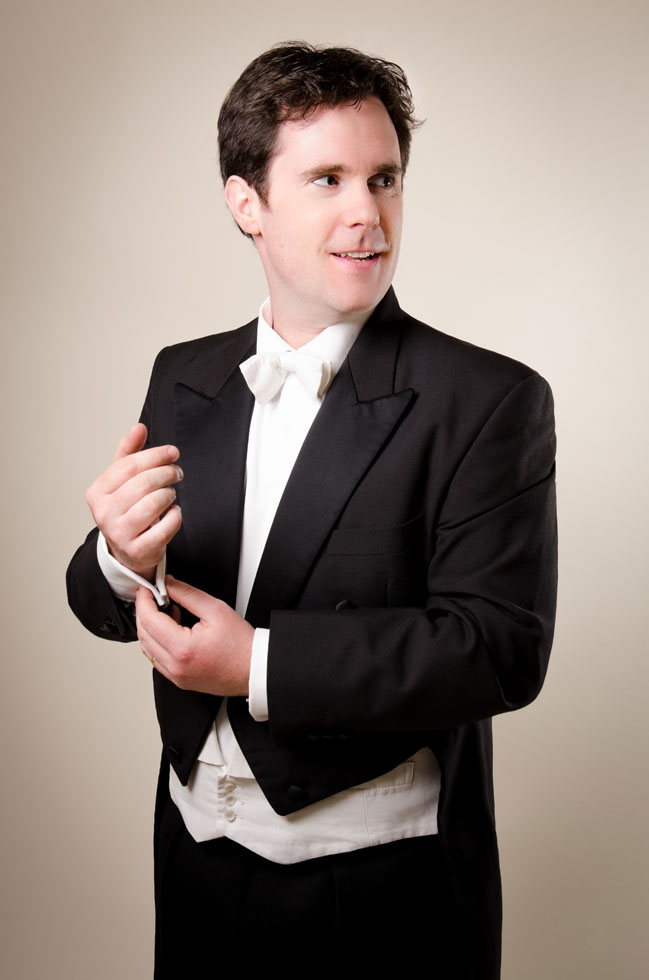
We interview tenor Nicholas Mulroy ahead of his concert Cubaroque, as part of Baroque at the Edge 2021, that invites leading musicians from all genres to take the music of the Baroque and see where it leads them.
Baroque at the Edge is not able to invite audiences to LSO St Luke’s for the 2021 festival. Instead all events will be available to buy online from now until the January release date, and subsequently available to view until 31 March 2021.
Mulroy was born in Liverpool, and has had a busy and varied career as a singer, where personal highlights have included Bach’s Matthew Passion in his own Thomaskirche, Monteverdi Vespers in Carnegie Hall, and two visits to the fantastic Australian Chamber Orchestra, as well as a broad discography including Handel, Purcell, and Piazzolla’s amazing María de Buenos Aires.
Mulroy combines singing with teaching at Goldsmiths, Cambridge, and the Royal Academy of Music, and directing. He has recently been named Associate Director of Scotland’s Dunedin Consort.
How did you become interested in becoming a tenor?
I sang as a child in Liverpool, and since then have always been involved somehow with music, whether singing or instrumental – when my voice changed I played in local youth orchestras, and had great fun in jazz and rock groups. I also sang salsa and played serenatas during my time in Ecuador, which was a lovely way of getting to know different kinds of music and performance style!
You regularly appear with leading ensembles throughout Europe, which ones do you remember as the most special ones?
I’ve had immense fortune to work with many amazing colleagues, whose inspiration and talent of course I miss at the moment. Every musician, and therefore every ensemble, has their own special energy and qualities, so it’s impossible to highlight some over others. I do, however, have fond memories of favourite concert halls: the Palau in Barcelona with its inimitable architecture; the Chagall ceiling in the Paris Opera; outdoor concerts in the Palacio Carlos V in the Alhambra. We are so fortunate as musicians to be able to work in these spaces, where the fleeting beauty of music can interact, often unforgettably, with architectural wonders.
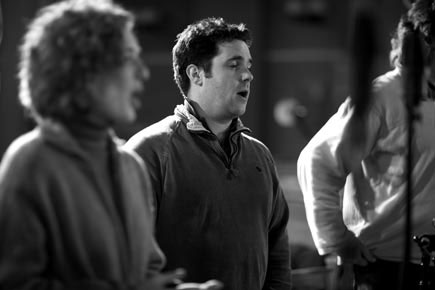
2020 has been a difficult year to culture with the cancellation of many events and concerts, how has the covid pandemic impact your career?
I think it’s fair to say that we’re all brought low by this pandemic, and not always supported either by governments, though some artistic institutions have been superhuman. There have of course been positives: the chance to refine and reflect, and the emphasis on inner geography is a positive side-effect when it comes to thinking about creativity. On the other hand, apart from the practical implications of having concerts deleted, and income decimated, I think what we all miss most is the very heart of what we do: trying to communicate something essential, and sharing a precious connection with an audience. The fact that so little is feasible at the moment diminishes both musician and listener.
Cubaroque takes place next week. You take a new brand-new exploration from three of this country’s most distinguished baroque musicians. What does it mean to you?
The music of the Baroque has been the central element of my career until now, so singing this repertoire – Monteverdi, Purcell, Marín – is always a little like a homecoming. It’s repertoire of such expression and beauty, and its durability is testament, I think, to the way it still has huge appeal and value now. It’s a challenge and a privilege to try to make the music of the past mean something for people today.
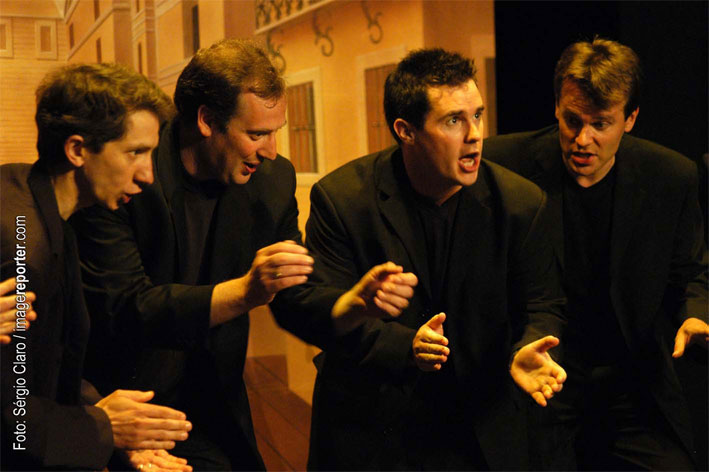
You investigate the cultural and political background of the 1960s Latin-American and Spanish song-writing giants. How do you approach them in Cubaroque?
We wanted to shine some light on these wonderful musicians, and respond to the domination of English-speaking pop music in today’s cultural landscape. Silvio Rodríguez and Víctor Jara are figures of gigantic significance but not well-known outside the Spanish-speaking world. Both carry importance both politically and artistically in a way that is rare anywhere, and shared by only very few: one thinks of Bob Dylan or John Lennon perhaps. The way their creativity interacts with political power is something they share with Purcell and Monteverdi, both of whom were based at institutions of far-reaching influence. In one sense, we’re limited by our instrumental possibilities, so we only play acoustically, and with one voice and two guitars (or similar instruments). We have found, however, that – in spite of the historical and geographical separation – all this music shares many things: sometimes a harmonic progression or a melodic echo, often a similar feeling of confessional intimacy, and always direct, truthful responses to the possibilities that these texts and stories offer.
«El feminismo es una forma de estar en la vida que todo lo impregna»
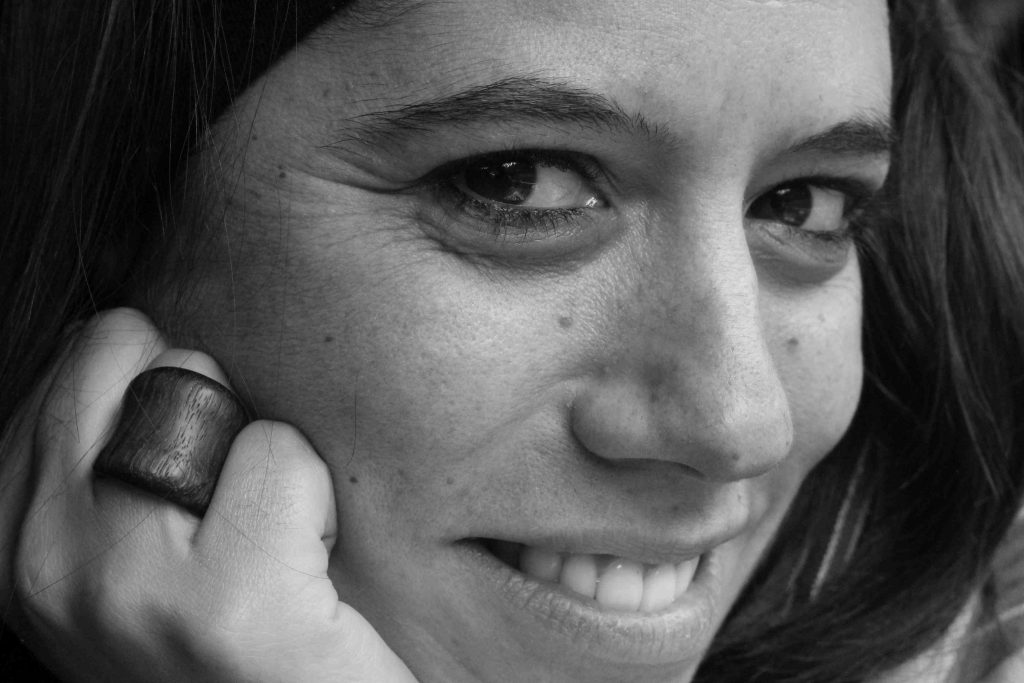
Entrevistamos a Olga Castro, Profesora Titular de Estudios de Traducción en la Universidad de Warwick. Castro es Licenciada en Periodismo por la Universidad de Santiago de Compostela (USC) y en Traducción e Interpretación por la Universidad de Vigo, se doctoró en 2010 en el Programa Doctoral Traducción & Paratraducción (T&P) con una tesis doctoral que recibió el Premio Extraordinario de Doctorado titulada Tradución, xénero, nación: cara a unha teoría e práctica da tradución feminista.
Actualmente trabajas como Profesora Titular de Estudios de Traducción, ¿cómo es la experiencia de trabajar en la Universidad de Warwick?
Llevo trabajando en la universidad británica desde 2010, cuando emigré desde mi Galicia natal, tras haber concluido mi doctorado en la universidad pública gallega. Antes de llegar a Warwick en 2019 pasé por las Universidad de Exeter y Aston (Birmingham). Cada lugar tiene sus particularidades. En Warwick estoy muy cómoda porque tenemos una Escuela de Lenguas y Culturas Modernas muy potente, con una oferta de programas variada y atractiva. Contamos con la posibilidad de crear asignaturas acordes a nuestros intereses de investigación, lo cual resulta muy motivador. En mi caso, eso ha implicado diseñar la materia «Género y traducción en el ámbito hispánico», en la que estudiamos a poetas y narradoras del Caribe, de Guinea Ecuatorial, de distintos países de Latinoamérica y también de España, inclusive algunas que escriben en lenguas propias distintas del castellano. Además, desde este año coordino también el Máster en Translation and Cultures, una tarea con la que disfruto muchísimo.
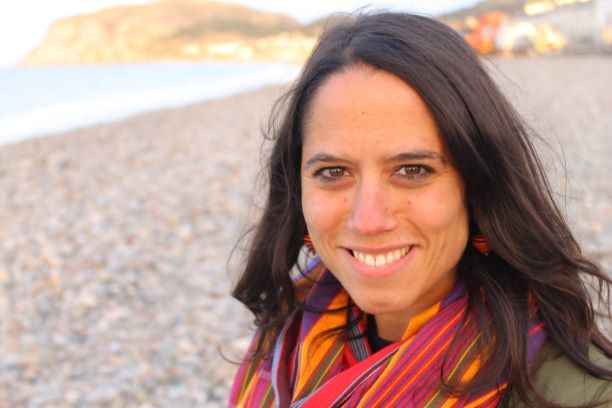
Este año fue la cuarta edición de los premios de traducción Warwick Prize for Women in Translation. ¿Qué valoración haces de esta iniciativa?
Es una iniciativa excelente para promocionar la traducción de obras de escritoras al inglés, tras llevar décadas constatando la discriminación y barreras que sufren las autoras extranjeras para acceder al mercado anglófono. De hecho, este premio forma parte de una serie de iniciativas surgidas en los últimos cinco años para tratar de cambiar esta realidad, como queda de manifiesto en el ebook de acceso abierto Translating Women: Activism in Action, que tuve el placer de coeditar, junto a Helen Vassallo, para el Institute of Translators and Interpreters in the UK. Volviendo al premio, el número de obras presentadas ha ido creciendo año a año, aumentando así el número de lenguas originales y territorios representados. Además, en la web del premio se pueden ver todas las obras preseleccionadas y finalistas, de manera que sirve como un catálogo a cualquier persona angloparlante interesada en leer escritoras extranjeras.
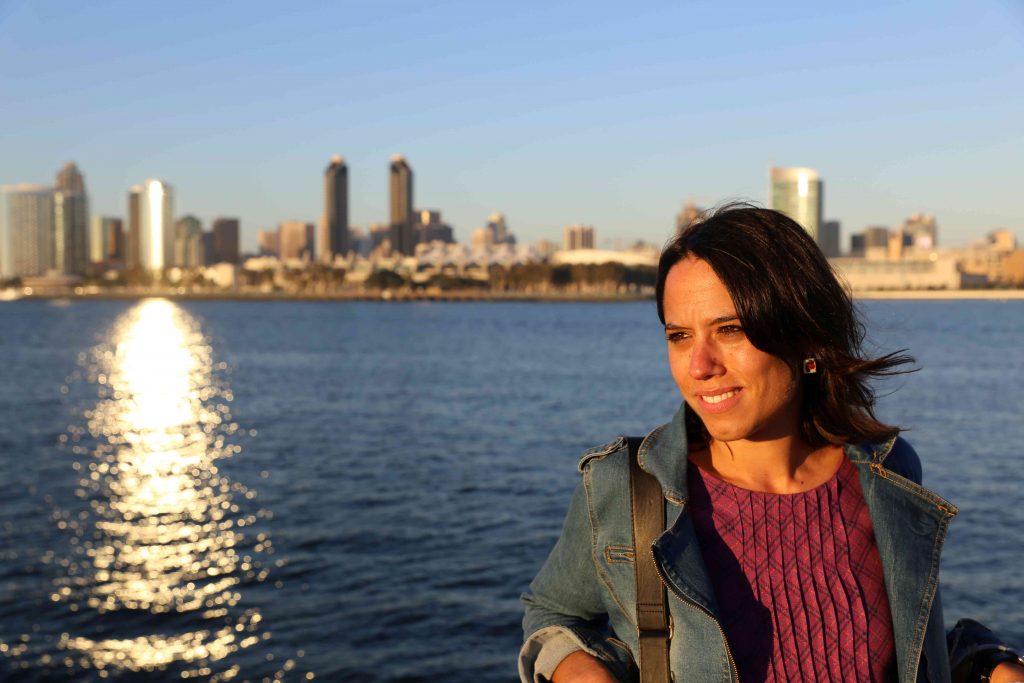
Tus principales áreas de investigación incluyen estudios de traducción feminista, ¿por qué te especializaste en este tema?
El feminismo es una forma de estar en la vida que todo lo impregna, y que a grandes rasgos busca erradicar la discriminación y lograr la justicia social para todas las personas del planeta. Trabajar en este tema me permite poner mi grano de arena a avanzar hacia esta justicia, desvelando donde reside la discriminación, analizando alternativas puestas en marcha y proponiendo estrategias que cambien en orden patriarcal establecido. Antes hablaba de las barreras, ya muy estudiadas, que obstaculizan la traducción de autoras de una forma que no afecta a los autores extranjeros; pero existen muchas otras áreas en las que urge actuar: desde la traducción publicitaria o audiovisual con su tendencia a exagerar estereotipos de género, hasta la traducción automática o realizada por personas en las que la/el mediadora lingüística añade sesgos sexistas que no estaban en el original, pasando también por la historia de la traducción, con la invisibilización de aquellas traductoras que reflexionaban sobre su práctica y que, por lo tanto, son también teóricas de traducción.

¿Qué cinco escritoras traducidas a inglés recomendarías y deberíamos seguir de cerca?
Con todas las escritoras relacionadas con el contexto del hispanismo que se están traduciendo en la actualidad, de lenguas y contextos diferentes, resulta difícil elegir. Entre las más recientes que he leído, y que más me ha conmovido, está la ecuatoriana María Fernanda Ampuero, con su libro Pelea de gallos (2018) traducido por The Feminist Press. Dentro de la Península Ibérica, la novela Amaren eskuak de Karmele Jaio es muy potente, y la traducción a inglés está publicada por Parthian. Sara Mesa es otra autora con muy buena acogida en inglés, ya próximamente tendrá cuatro novelas traducidas; entre ellas, me quedo con Cuatro por cuatro, publicada en inglés por Open Letter. Por supuesto, en la lista tiene que estar Melibea Obono, la primera escritora de Guinea Ecuatorial en ser traducida a inglés, con su novela tan combativa La bastarda disponible también en The Feminist Press. Me gustaría cerrar con una gallega, y de entre ellas destaco a Eva Moreda, residente en Escocia, cuya novela A Veiga é como un tempo distinto narra la experiencia de la emigración londinense, y que puede leerse en Francis Boutle. En todos los casos, es imprescindible destacar la extraordinaria labor de mediación cultural y lingüística a cargo de las traductoras y traductores, y desde aquí mi reconocimiento hacia ellas y ellos.
William Frost: «I think Spanish is a wonderful language and I feel like it is the most useful language to be learning right now»

William Frost is originally from Shrewsbury, but now he lives in Canterbury. He has moved around a lot as he teaches English as a foreign language; he spent two years teaching in Cologne, Germany. He also taught in London for some time where he came into contact with a lot of Spanish and Spanish speaking students.
He has done some independent journalism and video making mainly on the topic of Latin America and Iberia. Now he is training to become a secondary school teacher at Canterbury Christ Church University specialising in Spanish and French (Modern Foreign Languages). He is really enjoying this new challenge as it requires a lot of different skills.
– How did you become interested in learning Spanish?
Good question! I have always been interested in languages, but for a long time I knew almost no Spanish as I did not learn it at school or university. It soon became clear to me that if I wanted to have a career in languages then knowing at least some Spanish would be essential as it is such a widely spoken language in the world.
It was actually mainly through friends and ex-students that I had taught that got me into learning Spanish. I have found that if you make an effort to learn the language then native speakers will always encourage you, to help you progress.
– What do you like the most about Instituto Cervantes London?
I did used to go there to use the library which is fantastic; there is an brilliant selection of resources such as books, magazines, newspapers and films. The variety of books is great as you can find grammar and text books but also literature, history and art books. It caters to all tastes.
I also attend the conversation clubs. When I lived in London I used to go to the institute in person, but now I access them online. These are great sessions where we discuss a different topic each time, subjects like urbanism, global warming and climate change. The best thing about the sessions is that they are spaces where you can practice your speaking and listening skills in an unpressured environment. There are always native speakers conducting the sessions so if you are struggling with something they will help you out. Speaking is the skill I find most challenging so this benefits me a lot.
I have also attended some online cultural events such as a tribute to Mario Benedetti which as great as there were some live poetry readings in Spanish and English. I have a special interest in Uruguay so that one really caught my eye. The accent in that part of that world is a bit different so it was good to be able to listen to it. Uruguay is an amazing country and I hope to go back there when my Spanish is better!
– What do you like the most about learning the language?
What I like about learning Spanish is that you know that what you are learning is highly useful as so many countries in the world speak it as their mother tongue. This means that you have an insight into other parts of the world, especially Latin America. Also the sheer variety of different resources available means that whatever you are interested in you will be able to find something in Spanish. I have been watching some documentaries about South America on Netflix in Spanish recently which has helped a lot. I am also a fan of Pedro Almodóvar’s films so I enjoy watching them.
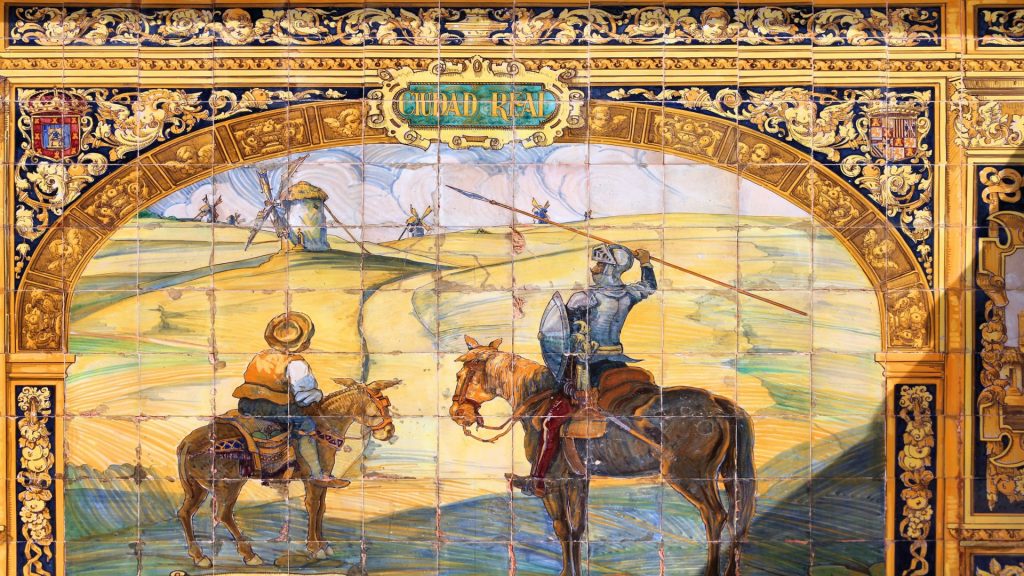
– Do you use Spanish in your daily life or do you plan to use it for your work?
I do use Spanish as part of my teacher training and I intend on using it a lot more when I qualify. Spanish is growing steadily in popularity at schools and this is reflected in the rise in pupils choosing to take it at both GCSE and A levels.
I also use it to read Spanish language newspapers online such as El País, which helps me keep up to date with what is going on.
– Why did you become interested in getting a certificate for Spanish language?
I became interested in doing the DELE certificate really because I wanted to know what my level was and what I needed to improve on. In that respect it was really useful. I also think it is really practical to have a clear goal in mind to focus your studies. That extra bit of pressure helps to structure what you are learning. It is also something more concrete to put on your CV or to talk about at interview.
I was lucky enough to visit the Cervantes Institute headquarters in Madrid last year were I saw some interesting exhibitions about Spanish in the world. It was there that I found out about the DELE exams. It is a fantastic place; if you get the chance to visit, I highly recommend it.
– How did you find the exam?
The exam was like all exams, a bit nerve wracking but completely worth it. You get a good sense of satisfaction once you find out you have passed! I had my speaking at the institute in central London and the other parts at the Cañada Blanch School in Kensington. Everything was seamlessly organised and ran smoothly. All of the staff at the Cervantes were very friendly and professional.
The certificate you get is the most elegant document I have ever seen. It was addressed to “Don William” which made it seem very official but I also it found hilarious!
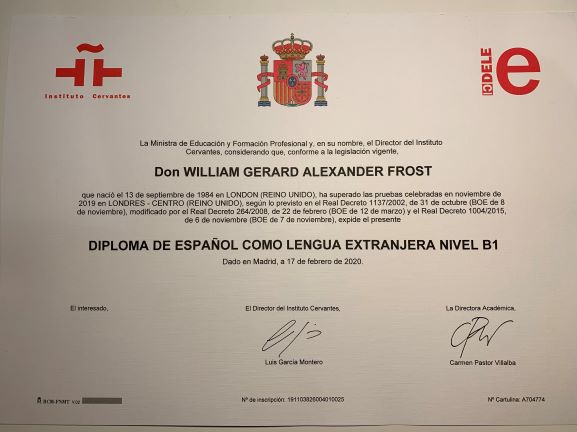
– Do you plan to continue studying Spanish?
I definitely plan to continue studying Spanish, I think it is a wonderful language and I feel like it is the most useful language to be learning right now. Learning in a language is a marathon not a sprint so I am in it for the long haul. It took me ages to remember that piragüismo means canoeing and I recently learned that pencil sharpener is sacapuntas. And I still get a bit confused between ustedes and vosotros, but I’m getting there! You have to keep topping up and refreshing your knowledge as it’s so easy to forget vocabulary! I am also considering taking the DELE B2 or C1 exam next year. ¡Adelante!
The Cervantes Institute has been brilliant in helping me improve my Spanish. But I have also learned about Spanish culture and how the language is used all over the world. At the moment, as travelling is so challenging with the pandemic, all of the online events and resources have been fantastic.
Cursos de Formación de Profesores de Español – Enero 2021
El Instituto Cervantes de Londres ofrece a los profesores de español de todos los niveles la a posibilidad de seguir formándose con regularidad. En estos cursos de formación se actualizan conocimientos didácticos, metodológicos y lingüísticos. Asimismo, los futuros profesores de español pueden realizar estos cursos como preparación para su futura carrera profesional. Consulta todos los cursos disponibles en nuestra web.
Cortos en femenino
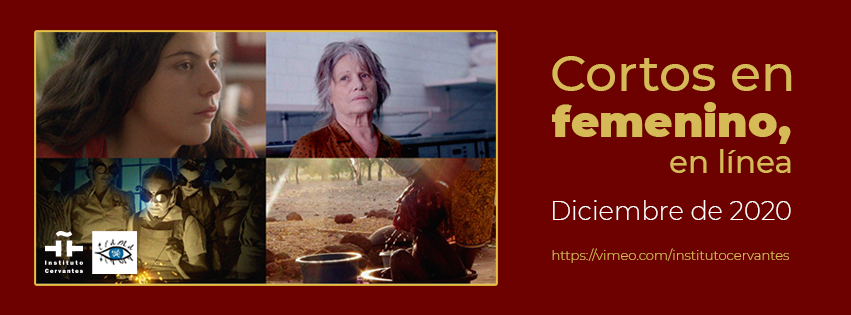
Durante el mes de diciembre, el Instituto Cervantes ofrece el ciclo en línea «Cortos en femenino». Diseñado por la coordinadora de festivales de mujeres en España, Trama, son cuatro ejemplos muy diferentes de la producción de cortometraje actual que muestran personajes femeninos diversos: dos cortos de ficción, «Centrifugado» y «No me despertéis», que rompen las expectativas de cada uno de sus géneros; el corto experimental «Dúctiles», que abre el imaginario sobre la representación de las mujeres; y el corto de montaje «Quand j’étais petit», que se abre hacia el entorno africano.
PROGRAMA
▶ 7 de diciembre: «Dúctiles» (Marisa Benito, 2018)
▶ 14 de diciembre: «Centrifugado» (Mireia Noguera, 2017)
▶ 21 de diciembre: «No me despertéis» (Sara Fantova, 2018)
▶ 28 de diciembre: «Quand j’étais petit» (Elena Molina, 2015)
Online Winter 2021 Spanish Courses
Due to the ongoing Covid-19 situation all our 2021 Winter Courses will be taught online in a friendly and supportive environment using video conferencing and distance learning tools. Check all our courses here.







